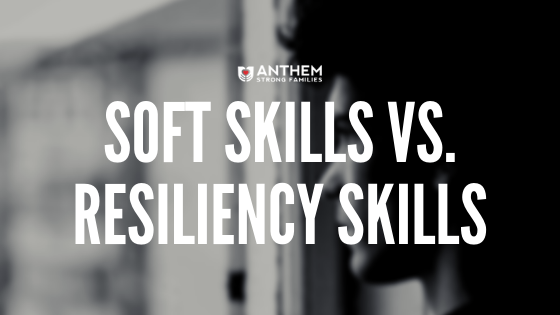Soft Skills vs. Resiliency Skills

At Anthem Strong Families one of our goals is to break cycles of generational poverty through resiliency. We know that one of the ways to reduce poverty and empower families is to offer pathways to work. Often in under-resourced communities surviving day-to-day is the overriding mindset that makes it difficult to see or plan for tomorrow and create a stable work-life plan.
There is a lot of information in our culture about the importance of having soft skills. Soft skills (also called life skills) include interpersonal skills like communication, critical thinking and positive attitudes and habits. Soft skills are important to cultivate however, they not enough. Developing resiliency skills is essential to navigating a happy life, staying employed and making sound decisions. It is those resiliency skills that will guide individuals to maintain a stable life and empower them to bounce back from setbacks.
In 2015, JP Morgan Chase issued a report for the Dallas area which identified a comprehensive need for middle-skill jobs in the healthcare and information technology industries and pointed to a growing pool of potential workers to fill positions. The report also states, “in dramatic contrast to the surrounding region’s economic prosperity, the city of Dallas has one of the highest concentrations of poverty in the nation. Many of these residents are unemployed or underemployed, preventing them from benefiting from the region’s economic growth. This opportunity gap is disproportionately affecting African-Americans and Hispanics, who represent a large and growing pool of potential middle-skill workers, just as the region needs to expand its talent pipeline.”
We understand that in order to properly prepare workers to be equipped to take on positions of increasing responsibility resiliency skills are necessary to teach family members. Corporations would also benefit in understanding resiliency as an important element that affects their bottom line. It’s one thing to hire individuals but another to retain and promote talent to the next levels that can fill those middle-skill jobs. Psychology Today lists some resiliency skills as:
- Being connected to others
- Being flexible
- Being able to make realistic plans and act to carry them out.
- Being able to communicate well with others and problem-solve both individually and with others.
- Being able to manage strong feelings.
- Being self-confident.
Dr. Matthew Shepherd, CEO Midwest Evaluation and Research has worked with us for more than 4-years as our evaluator. He offers a powerful case on why soft skills are not enough. You can read that report here.

